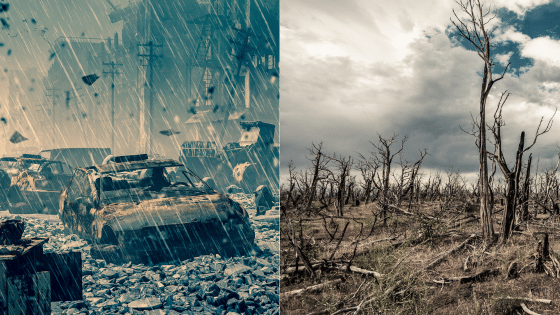I’ve been noticing something in my conversations with industry executives lately about the challenges of the energy transition: The “reckoning” has become the “apocalypse.” These executives now don’t think widespread climate action (leading to unreliable energy supplies) will result in just an inevitable reckoning for the energy-loving public. They think it means that public will suffer through an apocalypse, when energy isn’t delivered just when it’s needed most—for example, in a winter storm that knocks out a renewables-only grid for weeks, killing thousands and making millions suffer.
At first, I thought this move from “reckoning” to “apocalypse” was a one-off reactionary response to the hostilities oil and gas executives face daily from climate activists and many in the media, who of course offer their own apocalyptic visions of the future. But now I see this narrative getting some legs among executives who think that scaring the public is the only way to educate them. It’s somewhat understandable—and totally counterproductive. In this Both True, I offer you an alternative to the “competing apocalypses” school of thought.
Both of these things are true:
- Reasonable people can be concerned—even hawkish—about climate action.
- The same reasonable people are rejecting and will continue to reject the apocalyptic narrative that climate change will lead us to impending doom as well as the apocalyptic narrative that climate action will leave us all exposed to energy catastrophe.
The situation
The success of climate activism has resulted in a slew of energy transition actions—from pipeline rejections to public utility commission decisions—that have made oil and gas leaders’ jobs really, really difficult. In policy environments where the prevailing sentiment is that we can and should get off of all fossil fuels immediately (i.e., most blue states), companies charged with delivering energy today to meet the very real demand are facing increasing challenges. The challenges are real and imperil energy availability, reliability, and price.
I’ve argued for several years now that there will not be an energy reckoning where “the soccer moms revolt”—there will not be a storm disruption or a price hike so high that average citizens of a climate-hawkish population discover that they were wrong about climate action and suddenly realize that they do need abundant oil and gas for several years, or even decades, to come.
That a reckoning isn’t coming is a message that’s getting easier for me to deliver to industry leaders, because there are so many examples of its already having failed to materialize. We saw this most starkly in the political and activist reactions to Russia’s invasion of Ukraine and the predictable divisions between those who claimed the energy transition was over and those who claimed it had accelerated.
But now something new has emerged: a competing vision from energy leaders, of an energy apocalypse brought on by climate action. I have been getting the “How do we tell them about the impending apocalypse?” question from clients and audience members. While this conversation is still happening largely in private, I see that it’s getting the kind of interest and momentum that will soon translate into company speeches and public relations. Why?
Executives are worried about energy delivery. It’s easy for critics of oil companies and natural gas utilities to forget that our societal functioning is deeply dependent on the safe, predictable, consistent delivery of oil and gas to consumers every day. Company employees are tasked with ensuring that delivery before any other tasks, including energy transition work. But their energy delivery jobs are getting harder and harder due to regulatory, political, and stakeholder decisions—and company leaders are feeling the squeeze.
There is a desperate desire to break through the climate apocalypse narrative. Even before so much public pushback, executives genuinely worried about energy delivery disruptions from storms and other disruptive conditions. Today, growing populations and increasing energy consumption are now combined with a smaller margin of error and reduced redundancy—all thanks to policy decisions. This has raised the stakes. If these stakes continue to rise, leaders worry, thousands to millions of people could be left literally in the cold in future disruptions. But these genuine concerns are interpreted by skeptical stakeholders as defensive and unimaginative whining. So executives find themselves painting pictures of apocalyptic outcomes to break through.
It seems smart to prepare for the disruptions of the energy transition. I am wildly in favor of looking at adversity as opportunity. When executives’ concerns about major disruptions to energy delivery or cost are dismissed, many do what seems to be the next best thing: Prepare to pick up the pieces. It’s a solid leadership go-to move. But it’s a terrible approach to persuading stakeholders.
In fact, narrating the energy system collapse apocalypse is a truly terrible idea, period. Why?
Energy companies always take the fall for energy shortages. As we’ve seen in the past, energy companies take the blame for energy shortages, no matter what financial, policy, or regulatory factors may have contributed. Consumers don’t connect their attitude with their appetite for energy.
Apocalypse is not a business plan. I cannot believe that any serious executive team is going to sit by and let climate activists or regulators create the conditions in which tens of thousands of people may die. When pushed, even the most passionate energy apocalypse narrators conclude that they and their teams will do everything in their power to prevent and alleviate problems for their communities and customers.
We are already the bad guy, and playing the villain makes it worse. The apocalypse narrative simply doesn’t work, because stakeholders who won’t listen or have reasonable concerns about the energy system aren’t inclined to trust our narrative of the risks. In fact, by narrating an inevitable apocalypse, we fall into the role of a Muppet-movie villain, saying to them, “If you don’t want my energy, I’ll take my ball home, and you’ll freeze in the dark.” [Cue evil laugh]
What to do instead?
Listen patiently.Listening first provides us with important insights about what stakeholders know and care about. We cannot break through a climate apocalypse narrative without understanding deeply how each audience understands the moment, the risks, and the options. For example, in a regulatory proceeding, do the work with stakeholders to really understand the what, why, and how of their positions. Then, rather than narrating your needs from your point of view, you can narrate options that are responsive to their top priorities.
Envision. We must paint a picture of an energy future that is optimistic, realistic, and inclusive. Let’s translate the avoided energy and climate apocalypses into a clear, coherent narrative of what is possible and how we will contribute to getting there. Let’s give our stakeholders a vision to consider that encompasses many of the things they care about. We do so by articulating what our companies are doing today and intend to do tomorrow. For example, in that regulatory hearing, your company can offer a plan for the future that addresses many of the stakeholders’ interests, but perhaps on a longer time frame or with more technology flexibility. The company demonstrates its commitment through current proof points, such as investments in new technologies and demonstrated emissions reductions. Next year’s Both True and Energy Thinks podcast Season 7 will continue to build on this theme.
Thank you for another great year! If you like what you’re reading, please share with three colleagues. At Adamantine, we are building the energy future with our clients. Reach out for your consultation to learn more.
To your vision of the energy future,
Tisha

